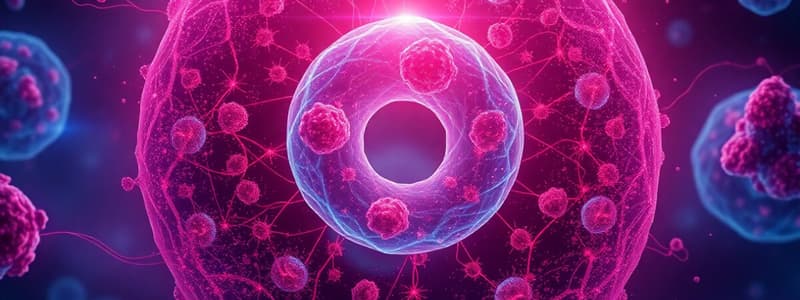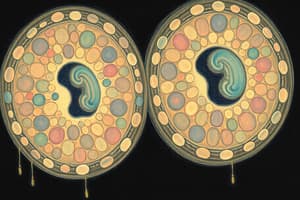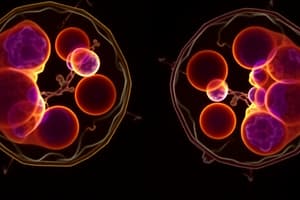Podcast
Questions and Answers
Which phase of the cell cycle is characterized by DNA replication?
Which phase of the cell cycle is characterized by DNA replication?
- S phase (correct)
- G0 phase
- G2 phase
- G1 phase
What is the main purpose of checkpoints in the cell cycle?
What is the main purpose of checkpoints in the cell cycle?
- To promote cell division
- To enhance DNA replication
- To destroy abnormal cells (correct)
- To duplicate organelles
What process describes the cytoplasmic division during cell division?
What process describes the cytoplasmic division during cell division?
- Apoptosis
- Karyokinesis
- Cytokinesis (correct)
- Interphase
During which phase of meiosis does crossing over occur?
During which phase of meiosis does crossing over occur?
What is the primary result of mitosis in somatic cells?
What is the primary result of mitosis in somatic cells?
Which of the following correctly describes the outcome of meiosis?
Which of the following correctly describes the outcome of meiosis?
What happens during the G1 phase of interphase?
What happens during the G1 phase of interphase?
Which of the following best describes apoptosis?
Which of the following best describes apoptosis?
What is a key feature of meiosis that distinguishes it from mitosis?
What is a key feature of meiosis that distinguishes it from mitosis?
Which phase of mitosis results in the formation of two identical nuclei?
Which phase of mitosis results in the formation of two identical nuclei?
What is the primary outcome of the G0 phase in the cell cycle?
What is the primary outcome of the G0 phase in the cell cycle?
Which events occur during prophase I of meiosis?
Which events occur during prophase I of meiosis?
What distinguishes cytokinesis in plant cells from animal cells?
What distinguishes cytokinesis in plant cells from animal cells?
What is the end result of meiotic division?
What is the end result of meiotic division?
During which phase of mitosis do sister chromatids separate?
During which phase of mitosis do sister chromatids separate?
What is a significant cause of cancer related to cell division?
What is a significant cause of cancer related to cell division?
What is the primary function of spindle fibers during cell division?
What is the primary function of spindle fibers during cell division?
What is the main purpose of apoptosis during embryonic development?
What is the main purpose of apoptosis during embryonic development?
In which phase of the cell cycle does DNA replication occur?
In which phase of the cell cycle does DNA replication occur?
What is the significance of the checkpoint in the cell cycle?
What is the significance of the checkpoint in the cell cycle?
Flashcards
Cell Cycle
Cell Cycle
Regular sequence of growth and division in a cell.
Interphase
Interphase
Longest phase; includes G1 (growth), S (DNA replication), and G2 (organelle duplication).
G1 Phase
G1 Phase
Cell increases in size during this part of interphase.
S Phase
S Phase
Signup and view all the flashcards
G2 Phase
G2 Phase
Signup and view all the flashcards
G0 Phase
G0 Phase
Signup and view all the flashcards
M Phase
M Phase
Signup and view all the flashcards
Karyokinesis
Karyokinesis
Signup and view all the flashcards
Prophase
Prophase
Signup and view all the flashcards
Metaphase
Metaphase
Signup and view all the flashcards
Anaphase
Anaphase
Signup and view all the flashcards
Telophase
Telophase
Signup and view all the flashcards
Cytokinesis
Cytokinesis
Signup and view all the flashcards
Cancer
Cancer
Signup and view all the flashcards
Apoptosis
Apoptosis
Signup and view all the flashcards
Mitosis
Mitosis
Signup and view all the flashcards
Meiosis
Meiosis
Signup and view all the flashcards
Crossing Over
Crossing Over
Signup and view all the flashcards
Spermatogenesis
Spermatogenesis
Signup and view all the flashcards
Study Notes
Cell Cycle
- Regular sequence of growth and division
- Consists of Interphase and M Phase (Cell Division)
Interphase
- Longest phase of the cell cycle
- Cell increases in size (G1 phase)
- DNA replication occurs, forming two sister chromatids (S phase)
- Organelles are duplicated (G2 phase)
- Non-dividing cells enter G0 phase (e.g., nerve cells)
- Checkpoint mechanism destroys abnormal cells during the cell cycle
- Nucleolus appears only during interphase
M Phase (Cell Division)
- Consists of Karyokinesis (nuclear division) and Cytokinesis (cytoplasmic division)
Karyokinesis (Nuclear Division)
- Occurs during the M phase
- Follows the PMAT stages: Prophase, Metaphase, Anaphase, Telophase
Prophase
- Nuclear membrane disappears
- Centrioles move to opposite poles of the cell
- Chromosomes become visible
- Spindle fibers begin to form
Metaphase
- Homologous chromosomes align at the equator of the cell
Anaphase
- Sister chromatids separate and move to opposite poles of the cell
Telophase
- Two identical nuclei form
Cytokinesis (Cytoplasmic Division)
- Occurs after karyokinesis
- Divides the cytoplasm and forms two new cells
- Each cell has 2n chromosomes
Cancer
- Uncontrolled cell division due to mutations
- Can be inherited or caused by environmental factors
Apoptosis
- Programmed cell death
- Plays a crucial role in embryonic development
Mitosis
- Occurs in somatic cells
- Produces two identical diploid (2n) cells
- Important for growth and regeneration
- One cell divides four times, resulting in 2^4 = 16 cells
- In plant cells, cytokinesis occurs through the formation of a cell plate
Meiosis
- Occurs in gonads (sex organs)
- Produces four haploid (n) cells
- Important for the formation of gametes (sex cells)
- Restores the original number of chromosomes in offspring
- Includes two cellular divisions: Meiosis I and Meiosis II
Meiosis I
- Starts with a diploid cell (2n)
- Divides into two non-identical haploid cells (n)
Meiosis II
- Similar to mitosis (except for interphase, which is present only in meiosis I)
- Produces four haploid cells (n)
Prophase I (Meiosis I)
- Centrioles move to opposite poles
- Spindle fibers begin to form
- Crossing over occurs between homologous chromosomes
- Homologous chromosomes pair up and exchange genetic material
- Leads to genetic variation
- Synapsis forms a tetrad (four chromatids)
Spermatogenesis
- Formation of sperm cells
- Occurs in the testes
Cell Cycle
- Regular sequence of growth and division
- Consists of interphase and M phase
Interphase
- Longest phase of the cell cycle
- Cell increases in size (G1 phase)
- DNA replication occurs, forming two sister chromatids (S phase)
- Organelles are duplicated (G2 phase)
- Non-dividing cells enter G0 phase (e.g., nerve cells)
- Checkpoints ensure the destruction of abnormal cells during the cycle
- Nucleolus appears only during interphase
M Phase (Cell Division)
- Includes karyokinesis (nuclear division) and cytokinesis (cytoplasmic division)
Karyokinesis (Nuclear Division)
- Occurs in four stages: prophase, metaphase, anaphase, and telophase (PMAT)
Cytokinesis (Cytoplasmic Division)
- Division of the cytoplasm
- Formation of two new daughter cells
Cancer
- Uncontrolled cell division due to mutations
- Can be caused by inherited or environmental factors
Apoptosis
- Programmed cell death
- Important for embryonic development
Mitosis
- Occurs in somatic cells
- Produces two diploid (2n) daughter cells
- No variation in genetic material
- Important for growth, regeneration, and reproduction in unicellular organisms
- One cell dividing four times results in 2^4 = 16 cells
- No cytokinesis in plant cells, cell separation occurs through the formation of a central lamella
Meiosis
- Occurs in gonads (sex organs)
- Produces four haploid (n) daughter cells
- Important for the formation of gametes and restoring the original chromosome number
- Consists of two cell divisions: meiosis I and meiosis II
- Interphase is present only in meiosis I
- Diploid cell divides to produce two non-identical cells (2n)
Prophase I (Meiosis I)
- Homologous chromosomes synapse to form tetrads
- Crossing over occurs, exchanging genetic material between homologous chromosomes
- This leads to variations in the offspring
Spermatogenesis
- Process of sperm cell formation
- Begins with a diploid spermatogonium
- Proceeds through stages of spermatocyte formation and maturation
- Results in four haploid sperm cells
Studying That Suits You
Use AI to generate personalized quizzes and flashcards to suit your learning preferences.




